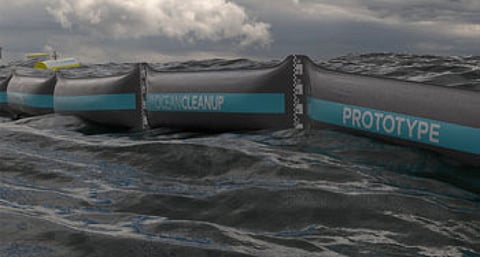

A Dutch foundation developing advanced technologies to remove plastic from the oceans, the Ocean Cleanup, has unveiled its North Sea prototype.
The prototype will become the first ocean cleanup system ever tested at sea once installed in the North Sea, 12 nautical miles off the Dutch coast, where it will remain for one year.
The objective is to test how the Ocean Cleanup's floating barrier fares in extreme weather at sea – the kind of conditions the system will eventually face when deployed in the Great Pacific Garbage Patch, a large collection of waste and plastics floating in the Pacific Ocean.
The 100 metre-long barrier segment will help validate the survivability of the system. Sensors will track every motion of the prototype and the loads it is subjected to.
Ocean Cleanup's technology uses floating barriers to passively catch and concentrate ocean debris as it is carried along by ocean currents. Although some litter may be caught during the North Sea prototype test, collecting plastic is not its objective.
"A successful outcome of this test should put us on track to deploy the first operational pilot system in late 2017," Boyan Slat, CEO and founder of the Ocean Cleanup, said.
He also notes that a successful test does not necessarily mean the prototype will survive. "I estimate there is a 30 per cent chance the system will break, but either way it will be a good test."
